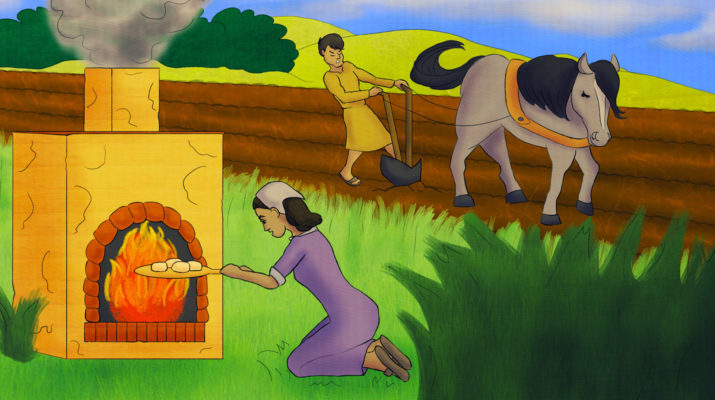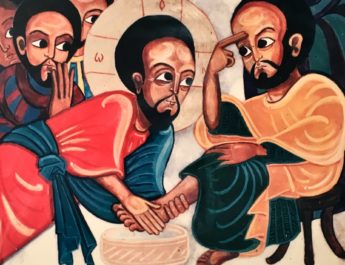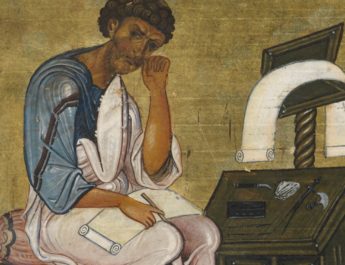BibleHub
1 AWhen SamuelB became old,C
Notes on verse 1a
A {untranslated} = hayah. This is to be or become, to happen.
B “Samuel” = Shemuel. From shem (name, fame, renown; indicating something essential about a person; honor, authority, or character); {may be from sum (to put, place, set)} + el (God, a god) OR from shama (hear, call, consent, or consider; implies listening intelligently, giving attention; obedience and action are often implied) + el (God, a god).This is Samuel meaning either the “name of God” or “heard of God.”
C “became old” = zaqen. From the same as zaqan (beard or chin – the beard represents old age). This is to be old or grow old.
he madeD his sonsE judgesF over Israel.G
Notes on verse 1b
D “made” = sim. Related to “Samuel” in v1. See note B above.
E “sons” = ben. From banah (to build or obtain children). This is son, age, child. It is son in a literal or figurative sense.
F “judges” = shaphat. This is to judge, defend, pronounce judgment, condemn, or govern. It can refer to God judging or to human judges. This is pronouncing a verdict in favor or against so it implies consequences or punishment. It can also mean to litigate or govern as one with authority.
G “Israel” = Yisrael. Related to “Samuel” in v1. From sarah (to persist, exert oneself, contend, persevere, wrestle, prevail) + el (see note B above). This is Israel, meaning God strives or one who strives with God; new name for Jacob and for his offspring. This refers to the people and to the land.
4 Then allH the eldersI of Israel gathered togetherJ and cameK to Samuel at RamahL
Notes on verse 4
H “all” = kol. From kalal (to complete). This is all or every.
I “elders” = zaqen. Related to “became old” in v1. From the same as zaqan (see note C above). This is old, aged, or elder.
J “gathered together” = qabats. This is to collect, assemble, heap, grasp, or gather.
K “came” = bo. This is to enter, come in, advance, fulfill, bring offerings, enter to worship, attack. It can also have a sexual connotation.
L “Ramah” = Ramah. From rum (to be high, rise, exalt self, extol, be haughty; to rise literally or figuratively). This is Ramah, meaning height.
5 and said to him, “MYou are old, and your sons do not followN in your ways;O
Notes on verse 5a
M {untranslated} = hinneh. From hen (lo! Behold! If, though; an expression of surprise). This is to draw attention, show suddenness or surprise, or to emphasize the importance of the coming statement. See! Lo! Behold!
N “follow” = halak. This is go, come, walk. It is walk literally and figuratively and includes people and animals. It can be used figuratively for one’s moral life – how we walk according to God’s way or against it. It can also refer to the walk of life as in the course one’s life takes, the choices we make, etc.
O “ways” = derek. From darak (to tread, march, to walk. Can also mean affixing a string to a box since one needs to step on it to bend it in the process; so also an archer). This is a road as a thing that is walked on. Can be used figuratively for the path that one’s life takes or how one chooses to live one’s life.
appointP for us, then, a kingQ to governR us, like otherS nations.”T
Notes on verse 5b
P “appoint” = sim. Same as “made” in v1. See note D above.
Q “king” = melek. From malak (to be or become king or queen, to rise to the throne, to be crowned; by implication, to take counsel). This is king or royal.
R “govern” = shaphat. Same as “judges” in v1. See note F above.
S “other” = kol. Same as “all” in v4. See note H above.
T “nations” = goy. From the same root as gevah (the back, person, or body); related to gev (among); related to gaah (to rise up). This is nation or people. Often used to refer to Gentiles or foreign nations. It can also be used figuratively for a group of animals. This is where the Yiddish “goy” comes from.
6 But the thingU displeasedV, W Samuel when they said, “GiveX us a king to govern us.”
Notes on verse 6a
U “thing” = dabar. From dabar (to speak, declare, discuss). This is speech, a word, a matter, an affair, charge, command, message, promise, purpose, report, request. It is a word, which implies things that are spoken of in a wide sense.
V “displeased” = ra’a’. This is to be evil, bad, afflict. Properly, it means to spoil – to destroy by breaking into pieces. Figuratively, it is to cause something to be worthless. It is bad in a physical, social, or moral sense – something that displeases, does harm or mischief, punishes or vexes.
W {untranslated} = ayin. This is eye in a literal or figurative sense so eye, appearance, favor, or a fountain (the eye of the landscape).
X “give” = natan. This is to give, put, set, offer. It is to give literally or figuratively.
Samuel prayedY to the Lord,Z 7 and the Lord said to Samuel, “ListenAA to the voiceBB of the peopleCC in all that they say to you, for they have not rejected you, but they have rejected me from being kingDD over them.
Notes on verses 6b-7
Y “prayed” = palal. This is to judge for oneself or in an official capacity. It can also mean to pray or make supplication, to entreat.
Z “Lord” = YHVH. Related to {untranslated} in v1. From havah (to be, become) or hayah (see note A above). This is the name of the God of Israel, the self-existent and eternal one, the tetragrammaton. This pronunciation has been lost to time so “Lord” is generally used in its place.
AA “listen” = shama. Related to “Samuel” in v1. See note B above.
BB “voice” = qol. This is a sound, used often for human voices. Also used when God speaks or angels, animals or instruments. It can be a cry or a noise, thunder or earthquakes and so on.
CC “people” = am. From amam (to darken, hide, associate; creating shadows by huddling together). This is people or nation. It can be used specifically for a tribe, collectively of troops or armies, or figuratively to refer to a flock of animals.
DD “being king” = malak. Related to “king” in v5. See note Q above.
8 Just asEE they have doneFF to me from the dayGG I brought them upHH out of EgyptII to this day,
Notes on verse 8a
EE “just as” = kol + maaseh. Literally, “according to all the works.” Kol is the same as “all” in v4. See note H above. Maaseh is from asah (to do, make, accomplish, become). This is a word – any action whether positive or negative. It can also be a transaction, construction, activity, property, or something that is produced.
FF “done” = asah. Related to “just as” in v8. See note EE above.
GG “day” = yom. Root may mean being hot. This is the day in a literal or figurative sense. It can also mean birth, age, daylight, continually or other references to time.
HH “brought…up” = alah. This is to go up, approach, ascend, be high, be a priority; to arise in a literal or figurative sense.
II “Egypt” = Mitsrayim. Perhaps from matsor (besieged or fortified place, bulwark, entrenchment; something hemmed in; a siege or distress or fastness); from tsur (to confine, besiege, to cramp). This is Egypt.
forsakingJJ me and servingKK otherLL gods,MM soNN also they are doing to you.
Notes on verse 8b
JJ “forsaking” = azab. To loosen, relinquish, permit, forsake, fail, leave destitute.
KK “serving” = abad. This is to work, serve, or compel. It can describe any kind of work or service (including religious devotion). Also, till or cultivate. Used causatively, it can mean to enslave or keep in bondage.
LL “other” = acher. From achar (to be behind, delay, be late, procrastinate, continue). This is following, next, strange, other.
MM “gods” = elohim. Related to “Samuel” and “Israel” in v1. From eloah (God, a god); from el (see note B above). This is most commonly used as a name for God. Technically, it’s in the plural, i.e. gods. It can also mean great, mighty, judge, or ruler.
NN “so” = ken. Perhaps from kun (properly, in a perpendicular position; literally, to establish, fix, fasten, prepare; figuratively, it is certainty, to be firm, faithfulness, render sure or prosperous). This is to set upright. Generally used figuratively to mean thus, so, afterwards, rightly so.
9 Now then, listen to their voice; only,OO you shall solemnly warnPP them and showQQ them the waysRR of the king who shall reignSS over them.”
Notes on verse 9
OO “only” = ak. Related to “so” in v8. Related to aken (surely, truly, nevertheless); from kun (see note NN above). This is a positive statement – surely, also, certainly, alone, only.
PP “solemnly warn” = ud + ud. This is to repeat, return, do again. This implies testifying something since that is a repetition. It can also mean to charge, admonish, protest, relieve, restore, or lift up. The word is repeated twice – the first time as an Infinitive Absolute. The Infinitive Absolute serves to emphasize the sentiment of the word. It is rather like Foghorn Leghorn’s speech pattern, “I said, I said.”
QQ “show” = nagad. This is to declare, make conspicuous, stand in front, manifest, predict, explain.
RR “ways” = mishpat. Related to “judges” in v1. From shaphat (see note F above). This is a verdict or formal sentence whether from humans or from God. It includes the act of judging as well as the place that judging takes place, the suit itself, and the penalty. Abstractly, this is justice, which includes the rights of the participants.
SS “reign” = malak. Same as “being king” in v7. See note DD above.
10 So Samuel reported all the wordsTT of the Lord to the people who were askingUU him for a king. 11 He said, “These will beVV the waysWW of the king who will reign over you: he will takeXX your sons
Notes on verses 10-11a
TT “words” = dabar. Same as “thing” in v6. See note U above.
UU “asking” = shaal. This is to ask, inquire, beg, borrow, desire, request. It can also mean to demand.
VV “be” = hayah. Same as {untranslated} in v1. See note A above.
WW “ways” = mishpat. Same as “ways” in v9. See note RR above.
XX “take” = laqach. This is to take, accept, carry away, receive. It can also have the sense of take a wife or take in marriage.
and appoint them to his chariotsYY and to be his horsemen,ZZ and to runAAA beforeBBB his chariots,
Notes on verse 11b
YY “chariots” = merkabah. From merkab (chariot, saddle, covering; any seat in a vehicle); from rakab (to ride an animal or in some vehicle; also, bringing on a horse). This is a chariot.
ZZ “horsemen” = parash. From parash (to make distinct, separate, scatter; can also imply to wound). This is a horse or a person who rides a horse. A chariot driver or cavalry as a collective.
AAA “run” = ruts. This is to run or rush, divide quickly, bring swiftly. It can also refer to a footman or guard.
BBB “before” = paneh. From panah (to turn, face, appear). This is face in a literal or figurative sense. It could be face, presence, anger, respect. It can also be used of God to indicate divine favor or presence.
12 and he will appoint for himself commandersCCC of thousandsDDD and commanders of fiftiesEEE and some to plowFFF his groundGGG and to reapHHH his harvestIII
Notes on verse 12a
CCC “commanders” = sar. This is chief, leader, ruler, lord, official, governor, prince, military leader. It refers to someone at the top of a rank or class.
DDD “thousands” = eleph. Perhaps from the same as eleph (herd, cattle); from alaph (to learn, speak, associate with). This is thousand.
EEE “fifties” = chamishshim. From chamesh (five, fifth). This is fifty.
FFF “plow” = charash. This is to scratch, which implies etching or plowing. It can mean to manufacture regardless of materials used. Figuratively, it can be to devise or conceal. It can also have a sense of secrecy. Hence, being silent or left alone. It can also be speechless.
GGG “ground” = charish. Related to “plow” in v12. 3x in OT. From charash (see note FFF above). This is plowing or the season in which one plows. It can also refer to the ground.
HHH “reap” = qatsar. This is to cut down, be short, reap, curtail. It is used especially for harvesting grass or grain. Figuratively, it can mean to be discouraged or grieve.
III “harvest” = qatsiyr. Related to “reap” in v12. From qatsar (see note HHH above). This is branch, harvest, one who harvests. Properly, this means severed, reaped. It is the crop being harvested, the time of harvest or the one who harvests. It can also be a bough.
and to makeJJJ his implementsKKK of warLLL and the equipmentMMM of his chariots.NNN
Notes on verse 12b
JJJ “make” = asah. Same as “done” in v8. See note FF above.
KKK “implements” = keli. From kalah (to end, be finished, complete, prepare, consume, spent, or completely destroyed). This is something that was prepared – any implement, utensil, article, vessel, weapon, or instrument. Also includes jewels, weapons, bags, carriages, and furniture.
LLL “war” = milchamah. From lacham (to eat or feed on; figuratively, to battle as a kind of consumption/destruction). This is battle, war, fighting, or one who fights (i.e. a warrior).
MMM “equipment” = keli. Same as “implements” in v12. See note KKK above.
NNN “chariots” = rekeb. Related to “chariots” in v11. From rakab (see note YY above). This is a vehicle, wagon, or chariot. It can be cavalry or an individual rider.
13 He will take your daughtersOOO to be perfumersPPP and cooksQQQ and bakers.RRR
Notes on verse 13
OOO “daughters” = bat. Related to “sons” in v1. From ben (see note E above). This is daughter in a literal or figurative sense.
PPP “perfumers” = raqqachah. 1x in OT. From raqach (to blend oil or ointment; perfumer; apothecary; prepare or combine spices). This is perfumer or confectioner.
QQQ “cooks” = tabbachah. 1x in OT. From tabbach (cook or guardsman); from tabach (to slaughter or butcher; of animals or people). This is a cook.
RRR “bakers” = aphah. This is one who cooks or bakes – particularly one who cooks meat.
14 He will take the bestSSS of your fieldsTTT and vineyardsUUU and olive orchardsVVV and give them to his courtiers.WWW
Notes on verse 14
SSS “best” = tob. From tob (to be pleasing, to be good). This is good, beautiful, pleasant, agreeable, bountiful, at ease. This word is used for goodness as a concept, a good thing, a good person. This can refer to prosperity and welfare as well as joy, kindness, sweetness, and graciousness. So, this is ethically good, but also enjoyably good.
TTT “fields” = sadeh. This is literally field, ground, soil, or land. It can be used to mean wild like a wild animal.
UUU “vineyards” = kerem. This is a vineyard, garden, vines, or a vintage.
VVV “olive orchards” = zayit. This is olive tree, grove, or other parts of the olive tree like the branch or berry.
WWW “courtiers” = ebed. Related to “serving” in v8. From abad (see note KK above). This is a servant, slave, or bondservant.
15 He will take one-tenthXXX of your grainYYY and of your vineyards and give it to his officersZZZ and his courtiers. 16 He will take your maleAAAA and female slavesBBBB and the best of your cattleCCCC
Notes on verses 15-16a
XXX “take one-tenth” = asar. 9x in OT. From eser (ten or -teen). This is to tithe, to give or receive a tenth.
YYY “grain” = zera. From zara (to sow or scatter seed; conceive or yield). This is seed or sowing. It can, thus, mean a fruit, plant, sowing time, child, offspring, or posterity.
ZZZ “officers” = saris. Root is likely foreign and may mean castrate. So, this could be a eunuch, valet, or other kind of officer.
AAAA “male” = ebed. Same as “courtiers” in v14. See note WWW above.
BBBB “female slaves” = shiphchah. Root may mean to spread out – it would be the same root used in mishpachah, which means family or clan. This is maidservant, female slave, or female bondslave.
CCCC “cattle” = bachur. From bachar (to choose, appoint, try, excellent). This is choice, chosen, selected. It is a youth or young man or cattle.
and donkeysDDDD and putEEEE them to his work.FFFF 17 He will take one-tenth of your flocks,GGGG and you shall be his slaves.HHHH
Notes on verses 16b-17
DDDD “donkeys” = chamor. From chamar (to be red, blush). This is a male donkey.
EEEE “put” = asah. Same as “done” in v8. See note FF above.
FFFF “work” = melakah. From the same as malak (messenger, an angel, or a deputy; human messengers literally or for prophets, priests, or teachers as messengers of God; also supernatural messengers i.e. angels). Properly, this is a deputyship or some kind of work. It can also be the product that comes from labor.
GGGG “flocks” = tson. This is a flock of sheep and goats.
HHHH “slaves” = ebed. Same as “courtiers” in v14. See note WWW above.
18 And on that day you will cry outIIII because ofJJJJ your king, whom you have chosenKKKK for yourselves, but the Lord will not answerLLLL you on that day.”
Notes on verse 18
IIII “cry out” = zaaq. This is to cry or call out. It can be a call to assemble or gather together. By analogy, this could refer to a herald who announces a public gathering. It could also be a shriek from pain or danger.
JJJJ “because of” = paneh. Same as “before” in v11. See note BBB above.
KKKK “chosen” = bachar. Related to “cattle” in v16. See note CCCC above.
LLLL “answer” = anah. This is answer, respond, announce, sing, shout, or testify. It means to pay attention, which implies responding and, by extension, starting to talk. Used in a specific sense for singing, shouting, testifying, etc.
Image credit: “Israel Wants a King” by Amy & Carly of Fishnet Bible Stories.




